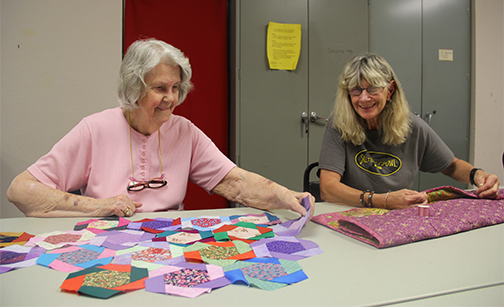Threading stories: 87-year-old instructor still stitching

Her needle has taken her to Oregon, Washington, California, Arkansas, Oklahoma and Canada. Certified through the Brazilian Dimensional Embroidery International Guild Inc., Charlotte Walker, 87, has taught across North America since 1984. Most days find her at College of the Mainland guiding students in embroidery, quilting and needlework.
“If she doesn’t know the answer, nobody knows it,” said Diana Kawlee, who takes her advanced quilting class at the COM 50 Plus Program.
Walker first picked up a needle around age 5 when her mother and grandmother taught her quilting.
“Somebody said my hands were made for stitches because it was so easy,” said Walker. “In those days, they got together and had quilting bees and we kids sat under the quilt waiting for them to stick their fingers and we’d laugh. We found out it wasn’t funny when we started quilting.”
She launched her teaching career first by assisting in her mother’s quilting classes. She began teaching quilting and sewing solo in 1988 and in 1991 she added Brazilian embroidery, which she learned from Gladys Sullivan at COM. Other needlework classes came in 1992.
Walker continues to create her own designs and patterns.
“I make hats and quilts for cancer patients at Texas Children’s Hospital. Student Linda Porter helped me and we do donation quilts for hospices,” said Walker, whose youngest son died of cancer in November 2008 and husband died of cancer in 2009.
Her childhood memories sometimes thread through her work.
“This is Polly, my cow when I was little,” she said pointing to one piece. “We lived on sixty acres in Hollister, California. My father was foreman of 30 acres of prunes, 20 acres of apricots and 10 acres of peaches. I’m a prune picker.”
Brazilian embroidery, which uses high-sheen thread, is especially delicate work. Each petal is 45-50 stitches. Each flower in a bouquet can take three hours or more, meaning a finished piece may represent weeks of dedication.
“We’re very lucky to have someone of her caliber, who’s known at the Brazilian Dimensional Embroidery International Guild’s Annual Conference in Portland, Oregon, said Alesha Vardeman, COM director of lifelong learning. “She’s very patient with students, though she makes them do it the right way. Her classes always fill up. She’s so full of energy and always has a smile.”
Walker now instructs advanced students and those who’ve never held a needle. She advises newbies: “If you want to do anything, you can. If you don’t want to, you can’t. Anything is awkward to begin with if you’ve never done it before, like using your cell phone if you’ve never used one before.”
Students select their own embroidery patterns or use ones she draws personalized for them.
“I’ve been doing this for about eight years. It gives me a little time to relax,” said Reda DeVries, one of Walker’s students. “We’ll all ask each other’s advice. You have a sense of community.”
Walker shows no signs of slowing down.
“I still hand quilt, and I’m beginning to machine quilt. My fingers are getting arthritis, but I don’t pay any attention,” said Walker.
For more information about Walker's classes, call 409-933-8226.
